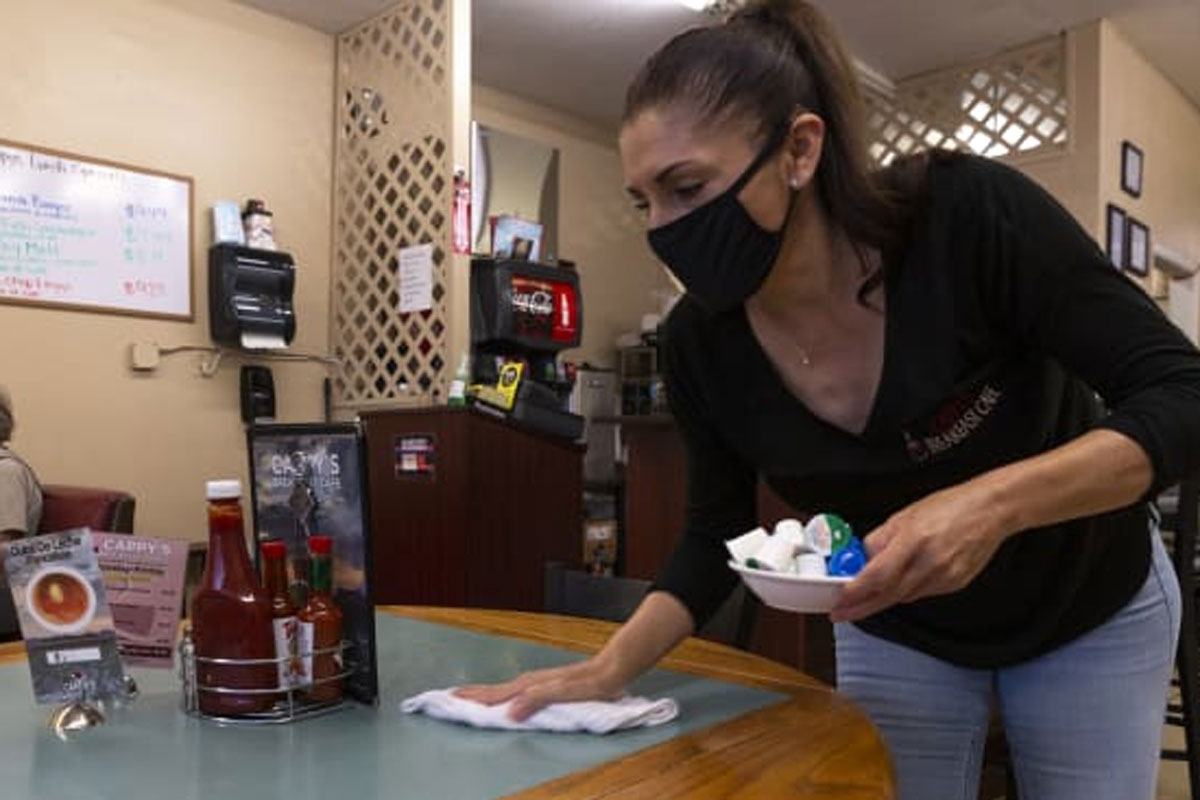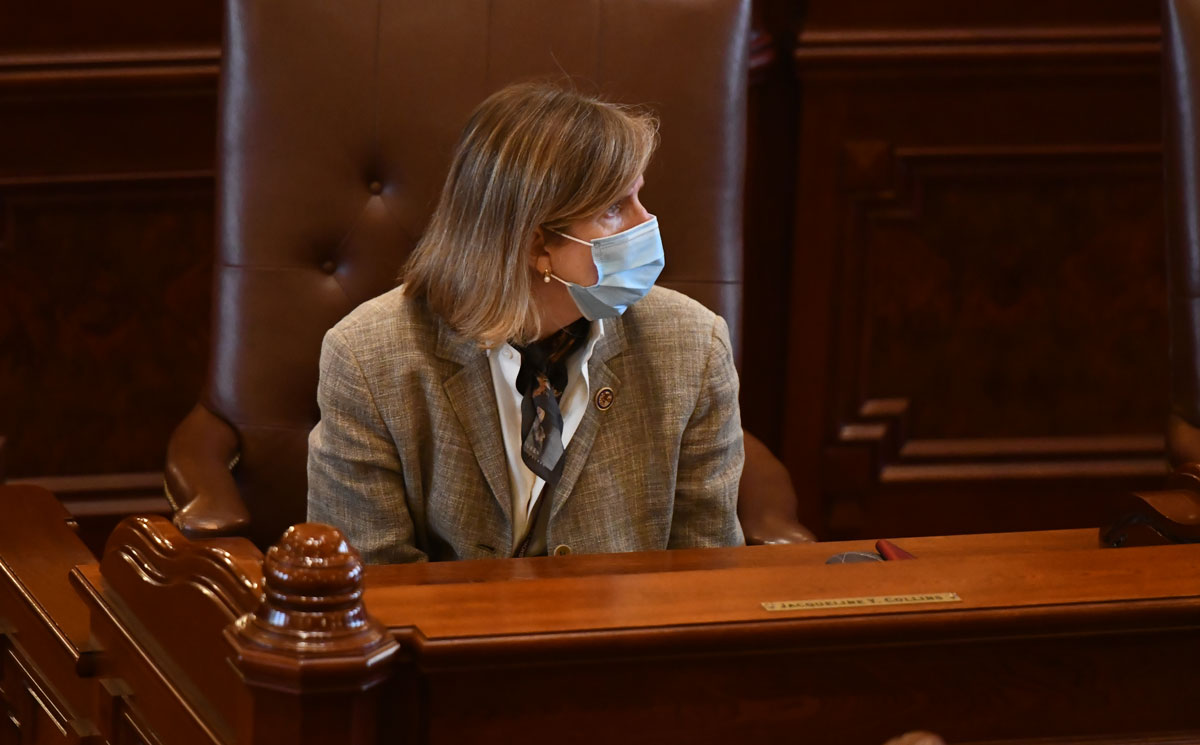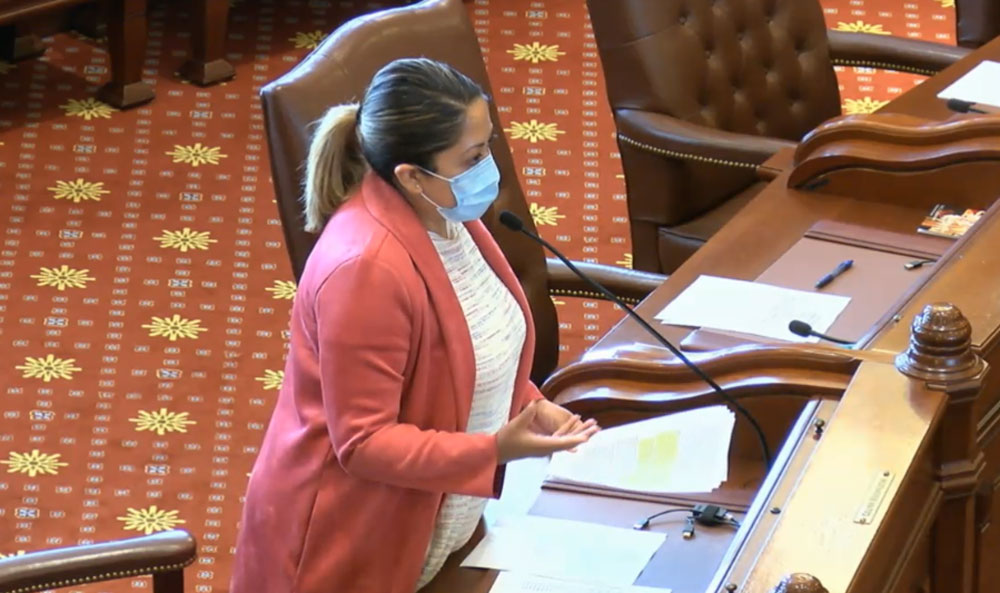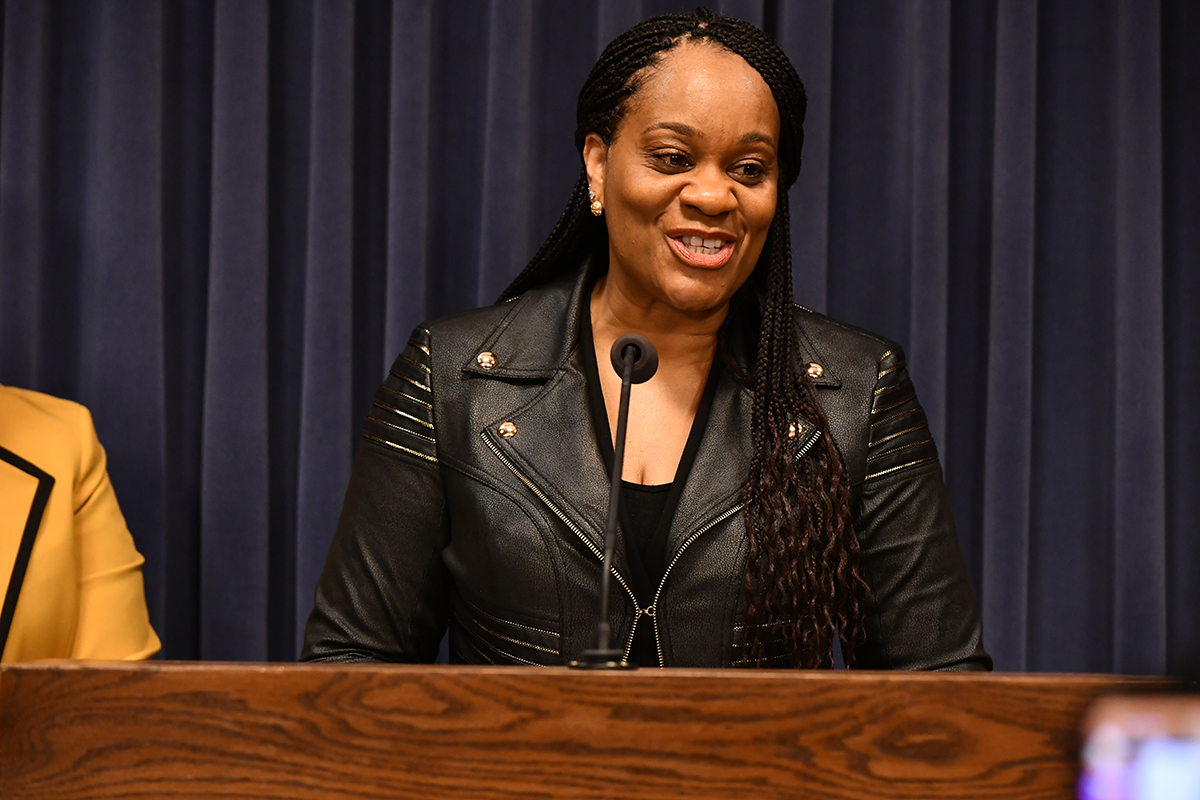- Details
- Category: Senator Pat McGuire News
 JOLIET – State Senator Pat McGuire (D-Joliet) encourages businesses and nonprofit organizations to utilize state and federal economic assistance as a COVID-19 surge threatens Illinois residents and hospitals.
JOLIET – State Senator Pat McGuire (D-Joliet) encourages businesses and nonprofit organizations to utilize state and federal economic assistance as a COVID-19 surge threatens Illinois residents and hospitals.
“We all must sacrifice to protect one another,” McGuire said. “The price of sacrifice varies. It costs next to nothing to don a mask, wash one’s hands frequently and maintain six feet of social distancing. But for impacted businesses and nonprofits, including bars and restaurants, the sacrifice is considerable. Yesterday 30 businesses and nonprofit groups in Senate District 43 were awarded state Business Interruption Grants ranging from $5,000 to $150,000. BIG funding is awarded on a rolling basis. It’s not too late to apply.”
- Details
- Category: Senator Iris Y. Martinez News
 CHICAGO – To help offset financial losses amid the pandemic, Assistant Majority Leader Iris Y. Martinez (D-Chicago) is pleased to learn 32 businesses in the district she represents have received financial assistance from the Business Interruption Grant (BIG) program, and she is encouraging more to apply.
CHICAGO – To help offset financial losses amid the pandemic, Assistant Majority Leader Iris Y. Martinez (D-Chicago) is pleased to learn 32 businesses in the district she represents have received financial assistance from the Business Interruption Grant (BIG) program, and she is encouraging more to apply.
“The small business community is among the hardest hit by the financial impacts of the COVID-19 pandemic,” Martinez said. “These funds will support operating costs while they adjust to mitigation and ensure their employees are compensated appropriately.”
In the district Martinez represents, 32 businesses received a combined total of more than $1.1 million in grants. Each business received between $5,000 and $150,000 to be used to help cover the costs of payroll, rent, utilities and other working capital during the time they have experienced interruptions due to the pandemic.
The Illinois Department of Commerce and Economic Opportunity awarded the grants this week, as part of the second round of the BIG program. However, applications will remain open until all of the funding is spent.
“Although these grants will offset some costs, nothing compares to the support of the community,” Martinez said. “I encourage residents to continue to shop at their local small businesses, especially when planning for the holidays.”
The BIG program is the largest state-run economic support program formed in response to the financial losses caused by the COVID-19 pandemic. Applications are available on DCEO’s website.
For a complete list of awardees, click here.
- Details
- Category: Senator Heather A. Steans News
 CHICAGO - As 51 businesses in the 7th district receive financial assistance from the Business Interruption Grant program to help offset financial losses stemming from the ongoing COVID-19 pandemic, State Senator Heather Steans (D-Chicago) encouraged more to apply Friday.
CHICAGO - As 51 businesses in the 7th district receive financial assistance from the Business Interruption Grant program to help offset financial losses stemming from the ongoing COVID-19 pandemic, State Senator Heather Steans (D-Chicago) encouraged more to apply Friday.
“This is encouraging news for the businesses who received this aid, but I know a lot of other businesses and organizations who qualify have yet to apply, and there are still funds available,” Steans said. “I urge every business and organization that has fallen on hard times to consider seeing if they qualify and applying.”
Fifty-one businesses received $1.8 million in $5,000-$150,000 grants to help cover the costs of payroll, rent, utilities and other working capital during the time they have experienced interruptions due to the pandemic.
The Illinois Department of Commerce and Economic Opportunity awarded the grants this week, as part of the second round of BIG Grants. However, applications will remain open until all of the funding is spent.
The BIG program is the largest state-run economic support program formed in response to the financial losses caused by the COVID-19 pandemic. Applications are available on the DCEO’s website.
- Details
- Category: Senator Laura Fine News
 GLENVIEW – More than $400,000 has been awarded to 20 North Shore businesses through the second round of the Business Interruption Grant (BIG) program, and millions of dollars are still available, State Senator Laura Fine (D-Glenview) announced Friday.
GLENVIEW – More than $400,000 has been awarded to 20 North Shore businesses through the second round of the Business Interruption Grant (BIG) program, and millions of dollars are still available, State Senator Laura Fine (D-Glenview) announced Friday.
“The pandemic hit our small business community hard. With increased mitigation measures now in effect in our region, many business owners are hurting,” Senator Fine said. “These funds will offer small businesses a hand, allowing them to retain employees and keep the lights on during this challenging time.”
In the district Senator Fine represents, 20 businesses—including restaurants, salons and performing arts venues—received a combined $415,000. Grants ranged from $5,000 to $90,000 to be used to help cover the costs of payroll, rent, utilities and other working capital during the time they have experienced interruptions due to the pandemic.
In total, more than $46 million has been awarded to 1,200 small businesses across the state in the second round of the BIG program. This investment builds on the $49 million awarded to more than 2,800 businesses in the first round of funding.
The Illinois Department of Commerce and Economic Opportunity awarded the grants this week, but applications will remain open until all of the funding is spent.
“I’m glad to see so many local businesses receiving aid from the BIG program to help them get through this tough time,” said Senator Fine. “I encourage all struggling small businesses to apply as soon as possible to ensure they get the support they need.”
The BIG program is the largest state-run economic support program formed in response to the financial losses caused by the COVID-19 pandemic. Applications are available on the DCEO website.
- Details
- Category: Senator Suzy Glowiak Hilton News
 OAKBROOK TERRACE –To help offset financial losses stemming from the pandemic, State Senator Suzy Glowiak Hilton (D-Western Springs) is pleased to learn 12 businesses in the district she represents have received financial assistance from the Business Interruption Grant (BIG) program, and she is encouraging more to apply.
OAKBROOK TERRACE –To help offset financial losses stemming from the pandemic, State Senator Suzy Glowiak Hilton (D-Western Springs) is pleased to learn 12 businesses in the district she represents have received financial assistance from the Business Interruption Grant (BIG) program, and she is encouraging more to apply.
“As we work to curb the rising number of COVID-19 cases, small business owners and employees are among the hardest hit by mitigation efforts,” Glowiak Hilton said. “These grants will support operating costs, and I encourage any business struggling to keep their doors open to apply as soon as possible.”
In the district Glowiak Hilton represents, 12 businesses received a combined $420,000 in grants. Each business received between $5,000 and $85,000 to be used to help cover the costs of payroll, rent, utilities and other working capital during the time they have experienced interruptions due to the pandemic.
The Illinois Department of Commerce and Economic Opportunity awarded the grants this week, as part of the second round of the BIG program. However, applications will remain open until all of the funding is spent.
“These grants can help offset some costs, but our community must also come together to support our local businesses during this difficult time,” Glowiak Hilton said. “With the holiday season approaching, I urge residents to look locally first when shopping.”
The BIG program is the largest state-run economic support program formed in response to the financial losses caused by the COVID-19 pandemic. Applications are available on DCEO’s website.
For a complete list of awardees, click here.
- Details
- Category: Senator Celina Villanueva News
 CHICAGO – Nearly a dozen local businesses in the district State Senator Celina Villanueva (D-Chicago) represents was awarded financial relief through the state’s Business Interruption Grant program. Now, she’s urging even more businesses to apply.
CHICAGO – Nearly a dozen local businesses in the district State Senator Celina Villanueva (D-Chicago) represents was awarded financial relief through the state’s Business Interruption Grant program. Now, she’s urging even more businesses to apply.
“I am pleased many businesses in the district took advantage of the assistance, and hope more will continue to do so,” Villanueva said. “These grants will go a long way to help struggling businesses keep their doors open.”
Eleven businesses in the district Villanueva represents received a combined $360,000. Each business received between $5,000 and $150,000 to be used to help cover the costs of payroll, rent, utilities and other working capital during the time they have experienced interruptions due to the pandemic.
The Illinois Department of Commerce and Economic Opportunity awarded the grants this week, as part of the second round of the BIG program. However, applications will remain open until all of the funding is spent. Villanueva encourages any small business in need to apply. Priority funding will be given to businesses located in areas with increased mitigation efforts.
“This pandemic had been especially tough on Latinx and Black communities – who already have fewer resources during a non-pandemic time,” Villanueva said. “Any business who still needs assistance is encouraged to apply as soon as possible.”
The BIG program is the largest state-run economic support program formed in response to the financial losses caused by the COVID-19 pandemic. Applications are available on DCEO’s website.
Villanueva: fondos de asistencia a negocios pequeños ayudarán a mantener una comunidad vibrante
CHICAGO – Casi una docena de negocios en el distrito que representa la senadora Celina Villanueva (D-Chicago) recibieron asistencia financiera del Programa Estatal para la Interrupción de Negocios. Ahora, la senadora invita a que más negocios soliciten los fondos.
“Estoy complacida de que tantos negocios en mi distrito hayan aprovechado la ayuda y espero que otros más lo hagan en el futuro,” dijo Villanueva. “Estos recursos harán una gran diferencia para contribuir a los negocios que enfrentan retos financieros mantengan sus puertas abiertas.”
Once negocios en el distrito que representa Villanueva recibieron en conjunto $360,000. Cada establecimiento recibió entre $5,000 y $150,000, que deben ser usados para pagar la nómina, renta, servicios y otros gastos durante el tiempo en que han alterado su funcionamiento por la pandemia.
El Departamento de Comercio y Oportunidad Económica de Illinois otorgó estos fondos esta semana como parte de la segunda ronda del Programa BIG. Sin embargo, la solicitud de fondos sigue abierta hasta que todos los recursos sean usados. Villanueva invita a todos los negocios pequeños que lo necesiten a que presenten su solicitud. Se dará prioridad a los establecimientos ubicados en áreas donde se implementan más medidas de mitigación para evitar contagios de COVID-19.
“La pandemia ha sido especialmente dura con la comunidad Latinx y afroamericana -quienes de por sí tenían menos recursos antes de la crisis sanitaria,” dijo Villanueva. “Todos los negocios que requieran apoyo deben solicitar estos fondos lo antes posible.”
El Programa BIG, es el programa de apoyo económico estatal más grande que fue diseñado para responder a las pérdidas causadas por la pandemia de COVID-19. La solicitud de fondos está disponible en el sitio de internet del DCEO en esta liga.
- Details
- Category: Senator Robert Martwick News
 CHICAGO – State Senator Robert Martwick (D-Chicago) is pleased 25 businesses in the district he represents received financial assistance from the Businesses Interruption Grant program to help offset financial losses stemming from the COVID-19 pandemic, and he is encouraging businesses to continue to apply.
CHICAGO – State Senator Robert Martwick (D-Chicago) is pleased 25 businesses in the district he represents received financial assistance from the Businesses Interruption Grant program to help offset financial losses stemming from the COVID-19 pandemic, and he is encouraging businesses to continue to apply.
“Small businesses have faced some of the greatest financial losses stemming from the COVID-19 pandemic,” Martwick said. “These funds are important to help keep business doors open while keeping the community safe.”
Twenty-five businesses in the district Martwick represents have received a combined $505,000. Each business received between $5,000 and $150,000 to help offset costs of payroll, rent, utilities and other working capital during the time they have been interrupted due to the pandemic.
The Illinois Department of Commerce and Economic Opportunity awarded the grants this week, as part of the second round of BIG Grants. However, applications will remain open until all of the funding is spent.
The BIG program is the largest state-run economic support program formed in response to the financial losses caused by the COVID-19 pandemic. Applications are available on the DCEO’s website.
- Details
- Category: ILBC Committee Roundup

To continue its work to combat systemic racism, the Illinois Legislative Black Caucus held a number of committees during the last week of October, covering topics from a lack of diversity in the workforce to disparities within the health care system.
The Senate held a joint hearing Monday to discuss the vast disparities Illinoisans face in access to treatment for addiction and mental health disorders.
“It’s crucial that we examine the intersections of mental health, bias and incarceration rates,” said Senator Patricia Van Pelt (D-Chicago), chair of the Senate Public Health Committee. “One in five people shot and killed by the police suffered from mental illness. People who should be getting treated for their illnesses are instead being abused, killed and locked up. We must begin to look at these issues differently.”
Legislators heard from mental health advocates including Dr. Rashad Saafir, CEO of Bobby E. Wright Comprehensive Behavioral Health Center, who broke down the cycle of disparity: Many African Americans who go to the emergency room for a mental health or addiction crisis will be released without continued care, oftentimes returning to homelessness. On the streets, where police serve as first responders, people who are mentally ill are more likely to be arrested. While incarcerated, they have little to no access to mental and behavioral health care.
Read more: Black Caucus Committee Roundup for week of Oct. 26
More Articles …
- Villanueva joins other local officials to host candy giveaway today
- Koehler announces $1,425,000 in Business Interruption Grant funding for 28 local businesses
- Murphy: $730K in grants will allow local businesses to continue operating with customer and staff safety in mind
- Harris: 20 local business have received financial relief, more need to apply
Page 607 of 768













 © 2026 Illinois Senate Democratic Caucus
© 2026 Illinois Senate Democratic Caucus